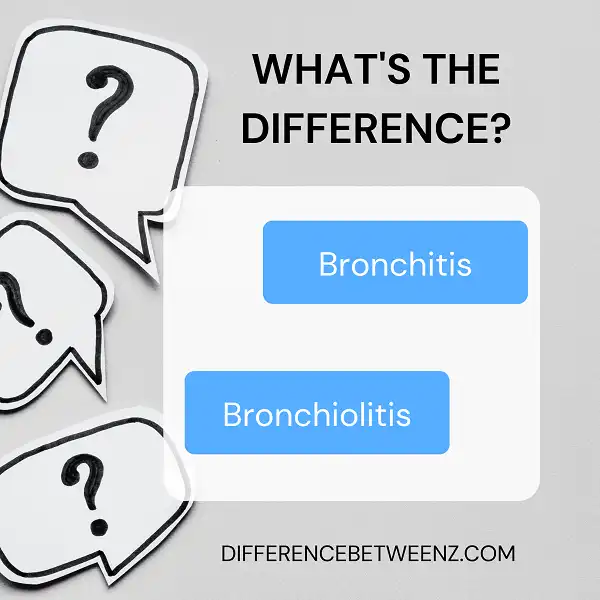Bronchitis and bronchiolitis can both be uncomfortable respiratory illnesses that come with coughing and other similar symptoms. It’s important to take an accurate assessment of the situation in order to differentiate between these two diseases, as each requires a unique set of treatments. In this blog post, we’ll provide a comprehensive overview of the differences between bronchitis and bronchiolitis so that you can better understand your condition. We’ll also outline symptom variations along with appropriate diagnostic tests and possible courses of treatment needed for each illness. If you’ve been feeling unwell lately, read on to find out what the difference is between these two potentially severe respiratory issues!
What is Bronchitis?
Bronchitis is an inflammation of the tubes that carry air to and from the lungs. Bronchitis can be acute, or short-term, lasting only a few days or weeks, or it can be chronic, lasting for months to years.
- Bronchitis is caused by viruses or bacteria, though it can also be triggered by asthma, smoking, allergies, air pollution, and inhaling irritants such as chemical fumes and dust. Symptoms of Bronchitis include chest congestion and a persistent cough that produces thick mucus.
- Bronchitis sufferers may also experience difficulty breathing and fatigue due to swollen bronchial passages which interfere with oxygen inhalation or exhalation.
- While some mild cases of Bronchitis clear up on their own, severe Bronchitis often requires medical intervention including antibiotics, steroids, coughing suppressants, and mucous-thinning drugs.
- Taking preventative measures such as quitting smoking and avoiding air pollutants when possible is also an important step in reducing one’s likelihood of experiencing Bronchitis symptoms.
What is Bronchiolitis?
- Bronchiolitis is a serious respiratory illness typically caused by a virus. It affects the airways and lungs, typically affecting young babies and children under two years in age. Bronchiolitis generally begins with cold-like symptoms such as a runny nose, fever, and cough.
- As the infection progresses, it can lead to difficulty breathing as the airways become inflamed and accumulate thick mucus. While it usually resolves on its own in two to three weeks,
- Bronchiolitis can be severe and may require hospital treatment if symptoms worsen or do not improve. It is important for parents to remain vigilant of any signs that their baby may be developing Bronchiolitis and to seek medical advice if necessary.
Difference between Bronchitis and Bronchiolitis
Bronchitis and Bronchiolitis are both respiratory illnesses, but they differ in many ways.
- Bronchitis is an infection of the bronchial tubes and is caused by a virus or bacteria, while Bronchiolitis is primarily caused by an infection with a specific virus which is most common in infants and young children.
- Bronchitis typically presents with symptoms such as coughing that can last for weeks, difficulty breathing, and phlegm production.
- Bronchiolitis, on the other hand, has milder symptoms including a cough and wheezing when breathing as well as nasal congestion.
- Additionally, Bronchiolitis usually only lasts a few days to weeks whereas Bronchitis can be chronic and last longer than three weeks.
It is important to note that Bronchitus requires medical attention from a doctor due to the potential for complications such as pneumonia; however, Bronchiolitis rarely causes any complications or requires medical intervention.
Conclusion
The main difference between bronchitis and bronchiolitis is that bronchitis is inflammation of the larger airways while bronchiolitis is inflammation of the smaller airways. Bronchiolitis tends to occur more in children under two years old than it does in adults, and it can lead to serious respiratory problems. If you think your child may have bronchiolitis, be sure to take them to see a doctor as soon as possible. Thanks for reading!


